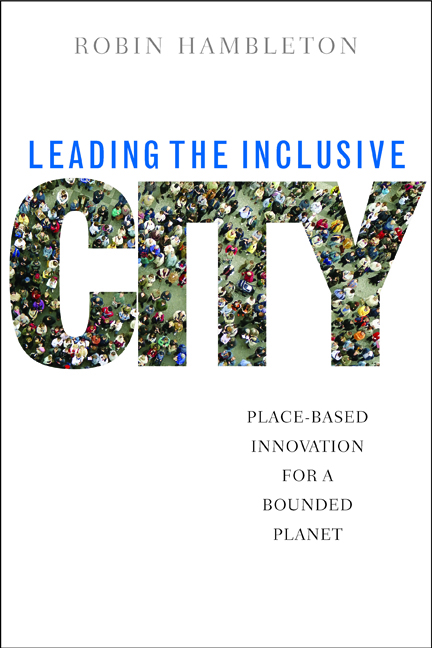Book contents
- Frontmatter
- Dedication
- Contents
- List of figures
- List of innovation stories
- About the author
- Preface
- A guide to the book
- Overview
- Part 1 Diagnosis: Understanding trends and challenges
- Part 2 Concepts: Place, leadership, innovation and democratic governance
- Part 3 Experiences: Place-based leadership in action
- Part 4 Lesson drawing: Insights and international learning
- Notes
- Appendix: International city networks and resources
- Acknowledgements
- References
- Index
Six - Leading public service innovation
Published online by Cambridge University Press: 08 March 2022
- Frontmatter
- Dedication
- Contents
- List of figures
- List of innovation stories
- About the author
- Preface
- A guide to the book
- Overview
- Part 1 Diagnosis: Understanding trends and challenges
- Part 2 Concepts: Place, leadership, innovation and democratic governance
- Part 3 Experiences: Place-based leadership in action
- Part 4 Lesson drawing: Insights and international learning
- Notes
- Appendix: International city networks and resources
- Acknowledgements
- References
- Index
Summary
What we need to add to our list of managerial skills is improvisation – the art of adjusting, flexibly adapting, learning through trial-and-error initiatives, inventing ad hoc responses, and discovering as you go
Frank J. Barrett, Yes to the Mess, 2012Introduction
Frank Barrett is an accomplished jazz musician. He is also a professor of management and public policy and, in his recent book, he constructs an intriguing conversation between the worlds of jazz improvisation and organisational innovation. His way of thinking provides many valuable insights, and we will draw on his analysis in this chapter. Early on he sets the tone:
Human beings are at their best when they are open to the world, able to notice what's needed, and equipped with the skills to respond meaningfully in the moment. Improvisation grows out of a receptivity to what the situation offers and thus the first move is a “yes to the mess”. (Barrett 2012, xii)
Whilst we did not know it at the time, Barrett's analysis aligns closely with findings emerging from research Jo Howard and I were carrying out on the leadership of public service innovation in the UK and The Netherlands (Hambleton and Howard 2012). Our action/research collaboration with three innovative cities indicates that a key role for civic leaders is to create a culture in which risk taking and experimentation are valued and encouraged. This is consistent with Barrett’s view that leaders need to embolden people to try something new, knowing that the results will, in all likelihood, be unexpected and ‘unexpectable’, including errors. This is not the dominant culture in public service organisations in most countries. On the contrary, too much of the time, the people who get promoted in public bureaucracies are those who can offer a ‘safe pair of hands’. There is a tendency for those who never take risks to get rewarded; the fact that conservative behaviour constantly misses opportunities is rarely penalised.
In stable times playing it safe, always taking the cautious route, might be acceptable. An adjustment here, a tweak there, a bit less of this, a sliver more of that, might enable organisations to survive and, in some circumstances, do tolerably well.
- Type
- Chapter
- Information
- Leading the Inclusive CityPlace-Based Innovation for a Bounded Planet, pp. 139 - 172Publisher: Bristol University PressPrint publication year: 2014



